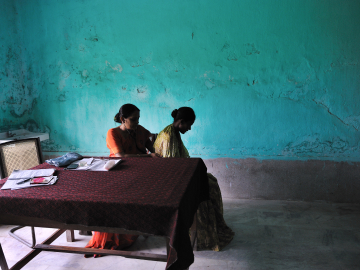Decolonizing Global Health: Change the Curriculum
One of global health students’ most sought-after experiences is participating in a project overseas.
But the applied learning component of many global health programs can lead to colonialist practices, says Anna Kalbarczyk, the assistant director of the Center for Global Health at the Johns Hopkins Bloomberg School of Public Health. Kalbarczyk, who teaches a course in international travel preparation, wants to see curricula revised so this kind of work doesn’t just benefit students from wealthy countries. And she says awareness of colonization issues should be built into other courses as well.
Should global health students be involved with projects in other countries?
It's well documented that these experiences are beneficial to students. We know that students who live and work overseas tend to have better cultural competency, that they tend to be more likely to end up serving lower income populations locally or abroad, regardless of their profession. And yet it is undocumented that these experiences are helpful to the populations that students are quote-unquote “serving.” And in many cases, they can actually be harmful.
Having been someone who benefited from short-term experiences in global health in my own career, I see their value. But I think we can do better. And I'm also very cognizant of calls that say we shouldn't do it at all, and I don't know that I entirely disagree.
What do you do in your own classes to alert your students to potentially colonialist practices?
We talk in class a lot about not working outside of your scope of work. We spend a lot of time as well as thinking through cultural competencies and ethical engagement, what used to be called in this type of course “ethical dilemmas.” But I don't think about them as dilemmas. I think about them as expressions of power and privilege. We work through different types of examples that can range from working within an organization and in an office, to working in a community, to working more broadly in unfamiliar settings. And among the things I have the students read and discuss is an article in Medium, “The White Savior Industrial Complex in Global Health.” [The article was originally published in BMJ Global Health.]
How can noncolonial projects be designed?
The entire project should be co-designed with local partners, so that there’s an explicit agreement that the partners want students there. And part of it should be an exchange of money if we’re sending students to work somewhere. Those students require someone’s time, someone’s energy, and we need to be paying for that and not assuming that host institutions will take responsibility for that.
We should also be intentional about twinning our students with students at institutions in low- and middle-income countries so that students can work together on a problem and learn from each other. They can do a literature review together. In the field, they can recruit people together. It’s really critical that we think about this as a true partnership, that it’s not local student as interpreter.
More views on decolonizing global health here.
Join the 50,000+ subscribers in 170+ countries who rely on Global Health NOW summaries and exclusive articles for the latest public health news. Sign up for our free weekday newsletter, and please share the link with friends and colleagues.




